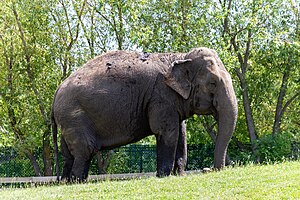Interview:Lucy - The Saddest Elephant in the World
Listen
Apple | Spotify | Google | Amazon | YouTube Podcasts
Summary

Billy Groom speaks with Yvonne Luscombe, an advocate investigating Lucy's situation at the Edmonton Valley Zoo and advocating for her transfer to a sanctuary.
Key Points:
- Lucy's Captivity History: Dating back to 1980, Lucy's captivity is discussed alongside efforts made by advocates to free her, highlighting parallels with other captive animals' experiences.
- Treatment at the Zoo: Lucy's treatment, including the use of bullhooks and "crushing" techniques, is addressed despite advocacy efforts and evidence of her suffering. The zoo claims Lucy is bonded to it and resists relocation.
- Government Response and Ethics: The inadequacy of government response, prioritisation of profit over welfare, and ethical considerations of captivity are discussed.
- Living Conditions and Health Issues: Concerns about Lucy's living conditions, health problems, legal challenges, and the efforts to improve her situation are highlighted.
- Advocacy Efforts and Expert Opinions: Organizations like LEAP advocate for Lucy's relocation, supported by expert opinions favoring her transfer to a sanctuary.
- Criticism and Advocacy: Criticism is directed towards the zoo's handling of Lucy's situation, urging for her relocation for better care and quality of life.
- Animal Welfare and Ethics: Various concerns about Lucy's treatment, terminology used in managing captive animals, and the ethics of captivity are raised, emphasising the importance of prioritising their well-being.
- Call for Action: The conversation ends with a call to action, urging listeners to support initiatives aimed at improving Lucy's living conditions.
The interview reveals a comprehensive discussion surrounding Lucy's plight, emphasising the urgency of addressing her welfare and the ethical responsibilities involved in caring for captive animals.
See also
- Lucy (elephant)
- Animal Talk
- Elephant Portal
- Elephant (interviews)
- Elephant (news)
- Elephant (research)
- Elephant (videos)
External links
- World’s Coldest & Loneliest Elephant Languishes in Edmonton Animal Justice
- Supreme Court dismisses case involving Lucy the elderly elephant CBC News
- Lonely Zoo Elephant Hasn't Had A Friend In 11 Years The Dodo
- The world's coldest elephant? Activists demand Lucy's removal from Canadian zoo The Guardian
- Friends of Lucy: Why We Support Recognition of Elephants’ Nonhuman Rights Nonhuman Rights Project
- LEAP Response to the Recent Medical Evaluations of Lucy LEAP
- Lucy the Elephant v. Edmonton (City) ABlawg
